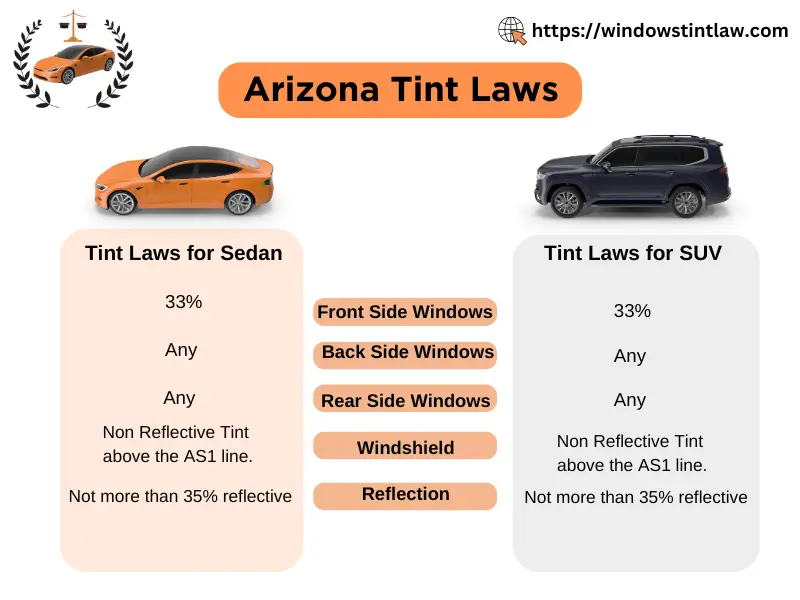Arizona Tint laws were regulated in 1994.
Tint laws define window tint in terms of tint darkness, Tint reflection and some other rules for the automobiles with Tinted Car windows.
All states have a common parameter which is Visible Light Transmission (VLT) to measure the Darkness of tinted windows, VLT refers to the amount of Visible Light transmitted through the Tinted car windows. Let’s say 70% VLT percentage means, 70% of visible light passes through the Vehicle Windows. The higher the VLT Percentage, less darker the window tint.
Overview of Arizona Tint Laws
The complete overview of Arizona Tint Laws for Sedan and SUV’s is elaborated in the below image. It shows the permitted percentage for Tint Darkness and Tint Reflection in Arizona. Check the detailed requirements for Materials on Windows or Windshield in Arizona issued by the state.

Darkest Legal Tint in Arizona
The below table shows the allowed percentage for tint darkness and tint reflection in Arizona. The restricted color tints are also mentioned. Drivers and owners of the vehicles must obey these rules to avoid penalties.
| State | Front Side Windows | Back Side Windows | Rear Windows | Windshield | Tint Reflection | Color Tints |
| Arizona | 33% | Any | any | Non Reflective Tint above the AS1 line. | Not more than 35% Reflective. | Red and amber color tints are not allowed. |
Window Tint Reflection
Tinted windows of Vehicles should not be reflective more than 35% as compared to standard car window, As the reflection from window’s tint causes discomfort for the other drivers.
Other Rules and Regulations for Vehicles with Tinted Windows
- Dual Side Mirrors are required if the rear window of automobile is tinted.
- Prohibited Tint Colors Red and Amber Tint colors are not allowed by the state laws.
- Certificate Window Film manufacturers don’t required to get certification to sell Tinted materials in Arizona.
- Stickers are not mandatory to display on Tinted Car windows.
Medical Exemptions
Residents of Arizona can apply for Medical exemptions from the state tint laws under certain medical conditions. If any person required to be protected from harmful UV rays due to some skin issues or vision problems, State law allows medical exemption.
To apply for an exemption, you need to complete an Application for the Window Tinting Exemption, certified by your doctor and submit to the Arizona Department of Transportation.
Frequently Asked Questions
Disclaimer: The provided information regarding the window tint laws is up to date and confirmed through our sources. If you have any further query regarding Window tint requirements and rules, please consult with nearby Department of Motor Vehicles.
